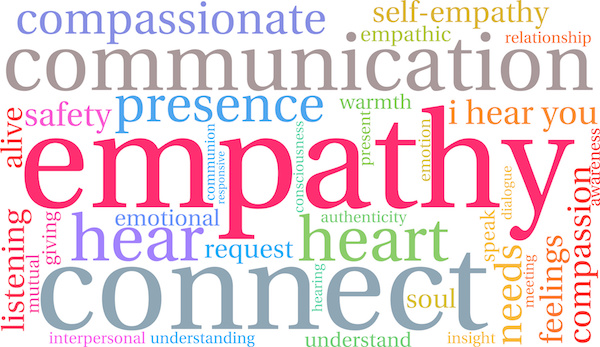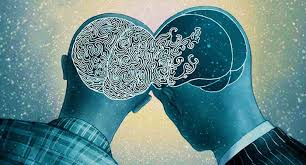Empathy: What is it, what are its pros and cons, and do we all have it? | Justine East-Campbell

I’m sure many of us have grown up hearing the term, “put yourself in someone else’s shoes”. In other words, empathy involves attempts to understand someone else’s perspective or experience and how they may be feeling. However, research by Psychologist Mark Davis suggests that this is only one type of empathy. He identified three main types, including the Cognitive or Perspective-Taking type, the Personal Distress type, and Empathic Concern.
Types of Empathy
- Perspective Taking is attempting to see things from someone else’s point of view.
- Personal Distress is the type of empathy in which you actually feel the emotion that another person is feeling. For example, while watching a movie you may begin to actually feel scared, happy, sad with a character. This is because you empathize with them. I often experience this and laugh at myself for crying as if I knew the person in the show.
- Empathic Concern may be most frequently recognized as empathy. This involves identifying someone else’s emotional state, understanding it, and then feeling and demonstrating suitable concern.
How does empathy develop?
Empathy takes time to develop. Young children often express whatever pops into their head about people in their environment. These true but hurtful observations are usually shared innocently. This is because they haven’t yet formed awareness or understanding of what another person is feeling. Younger children do not know what they might feel like in a particular circumstance them self. On the other hand, newborns may trigger crying in other newborns, however this could be more of a response to noise that is uncomfortable. Besides that we see children between the ages of 1 and 2 may try to comfort someone who appears sad.
My 15 month old niece will hug her older 4 year old cousin if he’s upset or crying.
As kids get older their empathy improves. They learn from how they are treated by their parents and others. They also learn from experiencing undesirable emotions, such as being scared or upset. Children begin speaking and develop conversations at different rates. It is important to talk to them about how they might feel in a situation or how they’ve felt in a similar situation in the past.
If your daughter takes a toy away from another child without asking, ask her to think about a time in which that happened to her. Ask her how she felt.
What are some of the benefits of having empathy?
Oftentimes when working with my clients to address some form of social or familial conflict, it’s empathy that helps them to be more understanding of what the other person may be going through. They are sometimes so focused on how they feel that they don’t consider the other person until it’s pointed out to them. Besides that, with greater understanding for the other person, they are usually more open to and better able to improve the relationship or resolve the conflicts.
Empathy increases pro-social behaviour: assisting or helping other people without expecting anything in return. For example, natural disasters such as the 2010 earthquake in Haiti, Hurricane Maria and the mudslides in Sierra Leone lead to persons providing support and relief.
Empathy helps people feel connected: listened to, valued, understood, and not judged.
Positive feelings may increase because of empathy. If you are less likely to take a negative interaction personally, you may lesson feelings of aggression or distrust.
After someone hurrying by bumps into you, thinking that they may have done so because they were rushing to an interview they were trying to get for months would be empathetic and reduce the chances that you would become annoyed.
What may be some of the negatives of having empathy?
It’s possible to become overwhelmed by someone else’s feelings, especially negative ones, causing your own suffering, and affecting your mental and emotional health. For example, a study from the Pew Research Centre in 2015 that incorporated the digital age, where people often read about friends’ stressors on Facebook or Twitter, established that the problems that one person goes through can be felt by others.
- Women who saw online that an acquaintance experienced the loss of a family member had a 14 percent higher stress level compared to other women.
- Men reported a 15% higher stress level than other men if they read that a person they were close to was accused of a crime.
Both genders experienced a 9 percent heightening of their stress level when someone they knew made a post about a demotion or pay cut.
If you’re in a helping profession (e.g., nurse, doctor, psychologist) you can feel burned out or fatigued, and it could make you biased to certain persons over others.
Empathy tends to affect our judgment and moral reasoning, for example, when we have to make decisions that involve more than one person. We can neglect persons with a greater need compared to those in our social circle if we are too emotionally attached to them.
***
There are many reasons someone could have or appear to have low empathy or concern for others. Therefore, if you suspect your child or someone else has problems in this area, speak to a professional such as your child’s Pediatrician, Guidance Counsellor or a Psychologist. A psychological assessment of their behaviours can help determine the reason behind their current functioning.
Written by Justine East-Campbell, Associate Clinical Psychologist
References
American Psychiatric Association. (2013). Diagnostic and statistical manual of mental disorders (5th ed.). Washington, DC: Author.
Bloom, P. (2014). Against empathy. In Boston Review. Retrieved from http://bostonreview.net/forum/paul-bloom-against-empathy
Dallas, K. (2015). “Too much of a good thing”: When empathy is overwhelming. In Deseret News. Retrieved from https://www.deseretnews.com/article/865622445/Too-much-of-a-good-thing-When-empathy-is-overwhelming.html.
Hampton, K., Rainie, L., Lu, W., Shin, I., & Purcell, K. (2015). The cost of caring. In Pew Research Center. Retrieved September 26, 2017, from http://www.pewinternet.org/2015/01/15/the-cost-of-caring/
Kutner, L. (2016). How children develop empathy. Psych Central. Retrieved from https://psychcentral.com/lib/how-children-develop-empathy/
Riggio, R. E. (2011). Are you empathic: Three types of empathy and what they mean. In Psychology Today. https://www.psychologytoday.com/blog/cutting-edge-leadership/201108/are-you-empathic-3-types-empathy-and-what-they-mean
Stosny, S. (2013). Limitations of empathy. In Psychology Today. Retrieved from https://www.psychologytoday.com/blog/anger-in-the-age-entitlement/201302/limitations-empathy
Taylor, S. (2016). Negative empathy. Is it possible to feel too much. In Psychology Today. Retrieved from https://www.psychologytoday.com/blog/out-the-darkness/201605/negative-empathy
Learn More



